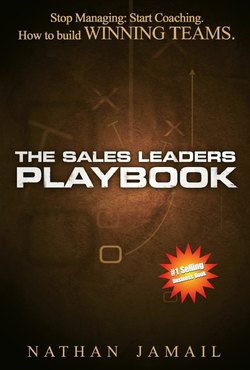Читать книгу The Sales Leaders Playbook - Nathan Jamail - Страница 7
На сайте Литреса книга снята с продажи.
Being a Leader: 20% - Coaching
ОглавлениеA successful leader must be a great coach. A coach is a person that improves his team on a regular basis. No matter how good your team is they can always improve and learn.
Being a good coach means creating a culture of constant practice and improvement. While it is important to recognize your team’s accomplishments, you should never become content. Even though most companies will agree that coaching is one of the most important skills to building a winning organization, most companies do not actually teach their managers how to coach.
Instead, when a person is promoted to manager, they are given sexual harassment training, employee review training, process training, etc. If an organization expects its managers to train and develop their employees, they must teach the managers how to be a coach. However, very few organizations have training to help managers learn how to be a coach.
Be Willing to Train
The organizations which struggle the most are the ones that hold their training departments (or similar such departments or people) accountable for training and developing their organization instead of the direct manager. It may be the training department’s job to create many of the curriculums, but is the leader or coach’s job to teach and develop their team members.
A coach (leader), much like in sports, is the person who is responsible for making each team member better. Coaches must hold everyone accountable to expectations given. It is their job to skillfully identify and apply everyone’s talents on the team. Lastly, a coach understands how to help individuals achieve their best performance.
When someone is managing rather than coaching, he or she will focus on people’s weaknesses and try to help them improve their weaknesses while allowing their strengths to sometimes stay stagnant. A great coach will focus on the team’s strengths and continue to push each individual to improve their greatest abilities in order to over compensate for any weaknesses. I am not suggesting you should completely ignore their weaknesses; they just should not be your focus.
Who’s on First?
In baseball, there are people who are designated hitters or a great pitcher who cannot really hit. Coaches do not focus on making a great pitcher a better batter; rather they make them an even better pitcher. So, why do we feel the need to always focus on people’s weaknesses in business? Let us explore how this affects the individual.
We all love to do things when we are good at them. In fact, we are usually more willing to work on making these strengths even better than on diminishing our weaknesses, which we feel will never improve. Also, if we can focus on our strengths at work, then we typically experience complete job satisfaction. On the other hand, if we are constantly working or doing tasks that we are not very strong at and constantly feeling like a failure, we are not going to enjoy our job and will typically find a more rewarding fit elsewhere.
The Line Up
Just like everything in life, there must be a balance, and a good coach will put the right people in the right place working on the right job.
Team members who have a great coach are able to make the two following statements:
1.My coach taught me new things last month.
2.My coach has scheduled practices for the team and makes them a priority.
Ask yourself this question: what successful coaches, in any sport, did not teach their players something on a monthly basis or did not make their team practice? So, why should it be any different in business? Manager is simply a title, but coach is the job of a great manager or leader.
I encourage managers to manage the business and to coach their employees. To coach an employee means to practice with them on a regular basis by making their strengths stronger and their weaknesses less weak. Imagine a football team who never practiced field goals, but instead waited until game day to “try it.” Consider a basketball team who never practiced free throws until game day, and then gave it their “best shot.”
Remember, the best team does not necessarily win because they always execute the most difficult plays. Most of the time, they simply practice the “basics” along with the “tried and true” plays, and combined with these they get winning results.
